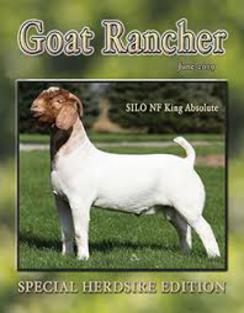Mississippi Buck Turned Mainah'
Saturday, June 1, 2019
Like many in the meat goat business, we do our research, read, investigate, ask questions, email and call whomever we can and yes leverage Facebook and YouTube to “Get Learned” about tips and tricks or anything under the sun related to the industry. I am no different but at some point, you have to take the plunge into the world of meat goats and so I did a few years back. I work full time from home and travel to meet the commitments of my remote-based role with a leading Education Technology company. Like many I keep my day job and try to move my ranch closer to profit with each passing year. I definitely stay busy trying to manage the herd on the side. Busy or not, I can’t help but try to drive my meat goat business with the next logical step … finding a 100% New Zealand herd sire to take my herd to the next level.
Finding a new herd sire for our ranch couldn’t be just any 100% New Zealand Kiko, it needed to be a buck that is hardy, independent, shows rapid growth rates, absolutely no hoof problems, is an aggressive forager, is a prolific breeder and looks badass standing in the field down by the road. Seriously, I drove by a ranch up north that had Bison on it. They were beastly. I had to stop and gawk from the side of the road. Really come on, everyone must admit that this last trait, looks, are super important too. It helps draw people to the breed. The broader and beefier (that’s a funny word when chatting goats) the buck looks, well you just can’t help a double take when you see a massive herd sire, for example, like Mike & Lorie Renick’s MRG Hemi’s XX (mrgoats.com/mrg-hemis-xx.html). Sure, our herd sires must have many, if not all the traits I listed but looks are important too. Some will disagree, and I understand why, but looks do matter. They say size does too. At least that is what I hear!
Our region presents a genetic bottleneck, in rural Northern Maine, when it comes to accessing the diversity that some customers want in their Kiko herds. Believe me, I am not against line breeding. I recognize it provides the best chance of strengthening the breed with the traits that we demand of Kikos. I figure if line breeding was acceptable in the old testament, then it works for me too. Nonetheless, one of my goals has been to “pop the top off” that bottleneck so that when customers come to me, I can provide options that allow the small hobby farmer or the big producer alike an option that meets their wants, not just their needs.
Last October, in taking the next step we looked high and low and considered a number of fantastic, potential, up and coming herd sires from around the country. Ultimately, we invested in a 100% New Zealand Kiko from way down south, a Mississippi buck, from a partnership many of you are intimately familiar with from Terry Hankins (Egypt Creek Ranch - ECR) and Mary McDonald & Sandy Rittenhouse (Rittenhouse Kikos - SRK), a blueish buck we named “Qato” (Qato chillin’ in the warm winter sun).
You might be saying “Qato”? Hmmm … “Why Qato”? Well my family landed on a naming convention when we first got started, and yes, we do treat our Kiko goat operation like a business, but a little fun with naming, well is just part of the investment. We only use 4 letter names, with 2 syllables, from all walks of life, from TV shows, Netflix and movies, to places we have been to on family vacations. We must use the entire alphabet before returning to a letter again. So we have names like Zulu, our first herd sire, Ratu our first herd dam, which means queen in the Maori language of the indigenous people of New Zealand, and doe names like Asia, Kona, Balu, Yari, and Hela and buck names like Odin, Loki, and Vali.
Our biggest concern was the massive climate swing this new buck would be challenged and have to endure, going from muggy Mississippi to a much colder Maine climate. This past winter we had 7 months of snow on the ground. Often it snows and melts, snows and melts but this year not so much. We had single digits most of the winter and often below zero single and double digits. Just one of those years. Not complaining, just setting the landscape for Qato’s arrival and subsequent winter activities with his co-herd sire Zulu (AKA “Cuddle Buddy” --- Qato on left and Zulu on right).
My wife, daughter and I picked up Qato, in Indiana, after his transport from Mississippi, at the Cream of the Crop Kiko Sale in Corydon, where we also purchased 2 fresheners and 2 doelings to complement our herd. After a 1300-mile drive in the back of a pickup truck, with an overnight stay in a hotel parking lot, torrential downpours on the way home and temps in the low 40s and upper 30s, Qato arrived to our ranch in Lee, Maine, raring to make his mark on the region. We isolated him, evaluated and tested him like good, responsible producers, for CL, CAE and JD and any other potential sale barn sickness or disease, in preparation to cover a few does late in the season. After being cleared by various blood tests, in late November, he settled three of our does that hadn’t been bred to date, rounding out our breeding season for the year.
Yes, even with the Kiko hardiness that we have come to expect, we couldn’t help but wonder how he would acclimate after his balmy Mississippi conditions. Qato had an overall terrific winter and he packed on the pounds during our extended winter conditions. This past week, Qato continues to perform …quite literally... putting on an Irish Riverdance performance and prancing around in show, to lure the fine young doelings that are quartering nearby, letting us know he is ready to take up the torch for the upcoming season. Like many, we cull until it hurts but with Qato on hand, we had a sellout season. We can’t wait to have the Mississippi turned Mainah’ cover even more of our herd in the upcoming 2019 breeding season (Qato --- “just point me in the right direction”).
(Josh and Kathy Crise, and their grown children, Amelia and Kevin, operate Marble Creek Acres in Lee, Maine. For interest in a future year’s Kiko waitlist, or any other questions, we can be reached at 207-619-3758, email [email protected] or marblecreekacres.com)



